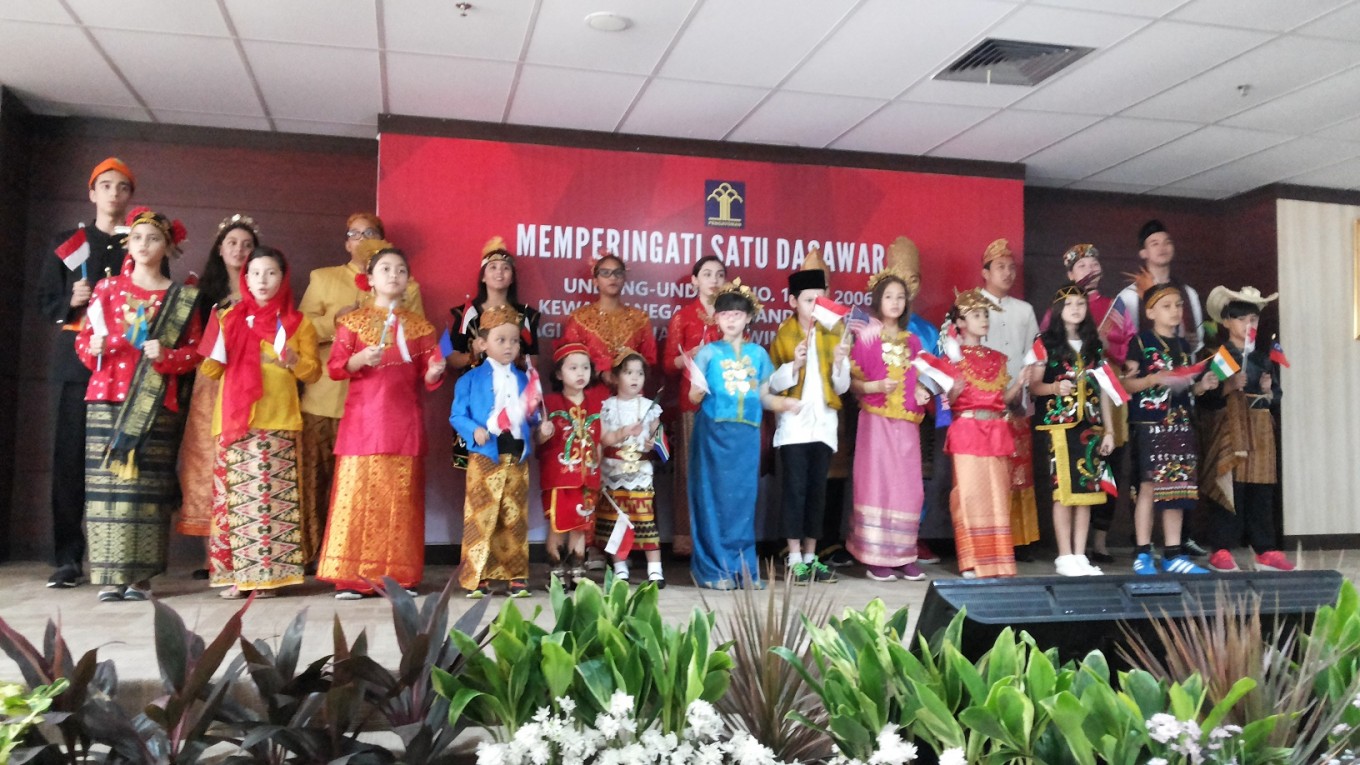Popular Reads
Top Results
Can't find what you're looking for?
View all search resultsPopular Reads
Top Results
Can't find what you're looking for?
View all search resultsMixed-nationality families eager to push for dual citizenship
Mixed-marriage families expect lawmakers to revise the Citizenship Law so that children and spouses can have dual citizeship.
Change text size
Gift Premium Articles
to Anyone
M
ixed-nationality families under the Aliansi Pelangi Antar Bangsa (APAB) aim to be more assertive this year in pushing the House of Representatives to revise the 2006 Citizenship Law and list it in next year’s National Legislation Program (Prolegnas), so that members of mixed families can obtain dual nationality.
APAB head Nia Schumacher said the urge to push for a revision was based on the House’s decision to incorporate the amendment of Citizenship Law in its 2020-2024 Prolegnas during the House’s plenary session on Dec. 17, 2019, along with another 247 bills on the list.
She also urged the House to expedite the deliberation of the bill as there had been no significant progress by lawmakers in following up on the call for dual citizenship, which the organization had demanded since 2002.
To persuade lawmakers to finally revise the law next year, the organization plans to hold meetings with nine factions at the House as well as prepare an academic study on the importance of dual citizenship for mixed families.
She also said that the organization would more frequently organize seminars in a bid to promote a revision of the law by the government and the House.
“We have plans for several agendas this year to push the House to include the revision of the Citizenship Law in next year’s Prolegnas,” Nia said during a webinar recently.
“But we’re not urging the House to make dual citizenship available for everyone. We only demand dual citizenship for spouses who have been married to Indonesians for at least 10 years and for the children of mixed marriages, as those two groups often struggle to get recognition from the country,” she added.
Dual citizenship is not recognized in Indonesia, which follows a single nationality policy, according to the Citizenship Law. The country still allows children from parents of different countries to have dual nationality, but they are obliged to choose one nationality after reaching the age of 18.
But for 18 years, the APAB, which represents around 6,000 members of mixed families inside and outside of Indonesia, has said that Indonesia's single citizenship policy undermines the well-being of families that have members of various nationalities – especially those who are still living in Indonesia.
Non-Indonesian family members have to obtain layers of work permits from the Manpower Ministry and complete voluminous immigration documents from the Law and Human Rights Ministry only just to secure a job in the country.
They are also prohibited from inheriting property such as land and houses from the Indonesian family members, because the country only grants Indonesian nationals ownership rights for such property, as stipulated in the 1960 Agrarian Law.
Children of mixed marriages who now live overseas and hold foreign nationality also often struggle to return to their actual home of Indonesia, as they have to go through immigration procedures to enter Indonesia.
Such difficulties have become more apparent during the COVID-19 pandemic, as the immigration authorities have severely restricted entry to the country for foreigners, leaving many people thousands of miles apart from their parents at a time of crisis.
Hope for obtaining dual citizenship surfaced in 2016, when the government planned to revise the law, but the lawmakers opposed the idea, citing “security concerns”.
“But this time, we hope the House will finally understand that [dual citizenship] is all about family relationships and will not see it as a ‘security issue’ anymore,” Nia said.
University of Indonesia legal expert Heru Susetyo said the country still could apply a dual citizenship policy, since the 1945 Constitution (UUD) did not explicitly state any obligation for Indonesians to only hold one nationality.
Implementing the policy, he added, could also be proof that the government was able to ensure mixed families have their basic human rights secured, such as rights to proper jobs, fair treatments in industrial relationships and ownership, as guaranteed in the country by the Constitution.
Bandung-based constitutional law expert Susi Dwi Harijanti from Padjadjaran University said she hoped that, should members of mixed families eventually obtain dual nationality, they would also perform their obligations as Indonesian citizens, such as paying taxes and obeying the Indonesian legal system.
“I think we should also focus on how [members of mixed families] will perform their obligations as Indonesian citizens after obtaining dual nationality and receiving the same rights as other Indonesians,” Susi said.
“Should the government revoke their dual nationality if they do not meet their obligations as Indonesian citizens? And under what circumstances could the government cancel their dual citizenship? I think these questions need to be discussed further,” she said.










